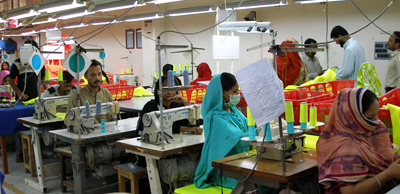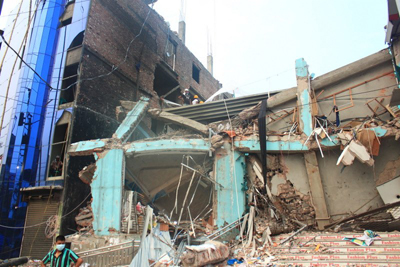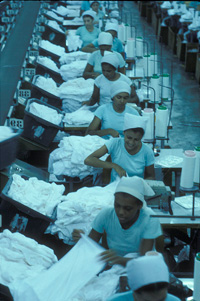- Home
- News
- Features
- Topics
- Labor
- Management
- Opinions/Blogs
- Tools & Resources
After Bangladesh How To Avoid Buying From Firms That Endanger Workers
By BRYCE COVERT, Think Progress— After the Bangladesh clothing factory collapse, responsible shoppers want to avoid supporting companies that don’t care about their employees. Here’s how.
Bangladesh’s $20 billion garment industry makes it the world’s second-largest apparel exporter, and the United States is its second-largest buyer after Europe.
With the factory collapse death toll now more than 800, American consumers may be looking to buy clothes that weren’t made in such working conditions. It is likely much better for the Bangladeshi economy and its garment workers for companies to invest in upgrades rather than flee the country, and those investments could cost consumers a mere 10 cents per garment.
But in the meantime, there are some places for American shoppers to turn.
Finding these retailers can be difficult, given how much American companies rely on Bangladeshi manufacturers, but some have either taken steps to ensure better working conditions or simply manufacture their clothing elsewhere.
Below are some of those retailers, although the list is far from comprehensive.
Help ThinkProgress build this list: Where do you buy clothing that is sourced from humane working conditions? Leave your suggestions in the comments and we will update the post.
Levi Strauss & Co.
Sells: Full range of men’s and women’s apparel
Levi Strauss & Co. claims to be the first multinational apparel company to establish a code of conduct for its suppliers in 1991. Its Terms of Engagement outlines rules for child and forced labor, working hours and wages, freedom of association, and detailed safety requirements. While it still sources from factories in Bangladesh, it doesn’t use multistory facilities that have factories with different owners, and in the past it has taken action to police the standards in its facilities. When it found that two factories in Bangladesh employed child workers, it decided to keep paying the workers while they attended school and offer them full-time jobs once they were of legal working age rather than fire them.
Patagonia
Sells: Outdoor apparel and gear
While it has factories in Bangladesh, it has eight in the U.S. and a Code of Conduct for its suppliers that expressly prohibits unsafe working conditions, child labor, and excessive hours and encourages higher wages and unionization.
Land’s End
Sells: Jeans, shirts, and sweatpants as well as home and pet items
Land’s End launched a “Made in the U.S.A.” collection in 2012 with its Durable Goods line. The line offers clothing, home, pet, and specialty items.
Brooks Brothers
Sells: Men’s dress clothes
Brooks Brothers has a clothing line of men’s dress shirts, suits, ties, and dress shoes that are made in the United States. The company also has a commitment to philanthropic spending and partners with non-profit organizations related to health issues, education, and the arts.

Better worker safety laws needed: An apparal factory in Karachi, Pakistan. Photo: UNDP/Mehreen Saeed
New Balance
Sells: Sneakers and sportswear
New Balance has a line of sneakers either made in the U.S. or assembled here.
American Giant
Sells: Men’s sweatshirts, T-shirts, and sweatpants
Seeking to address the fact that “most clothes we love…are made in countries that are so far away, the only American job it created was a store clerk,” the company sources its materials and manufacturing in the U.S.
Alta Gracia
Sells: College apparel
Alta Gracia’s products are made in the Dominican Republic, where it says it pays a living wage, sometimes “more than three times the minimum wage,” respects the right to form a union, and ensures a safe workplace. The Worker Rights Consortium ensures that the company is compliant with these standards through on-the-ground monitoring.
Flint and Tinder
Sells: Men’s underwear and accessories
The company manufactures all of its products in the U.S. in its own facilities, which started with a single factory and has expanded to a larger group. It says that for every 1,000 pair of underwear it sells in a month, it adds at least one job in its supply chain.
Here are more retailers thanks to reader comments:
Carhartt
Sells: Work pants and jeans, outerwear, and shirts
The retailer’s production comes mostly from company-owned factories in the U.S. and Mexico. It also has a Workplace Code of Conduct based on the Core Conventions of the International Labor Organization and the UN’s Universal Declaration of Human Rights.
Pact
Sells: Men’s and women’s tops and intimates
The company says it is committed to using sweat shop-free factories that it visits multiple times a year. It also sources its materials from eco-friendly and organic factories.
Everlane
Sells: Men’s and women’s tops and accessories
The company claims to “spend months seeking out the best” factories that specialize in different fabrics and construction methods.
Shockoe Denim
Sells: Jeans
The company is family owned and operated and manufactures its products in the U.S. It also says that “all raw materials used in our jeans can trace their origins to a US factory or workshop.”
AG
Sells: Jeans
Every step of manufacturing the jeans is done under one roof in the U.S., including design, sewing, and finishing. It also uses eco-friendly practices and recycles its scraps.
For more ideas, you can check out the Made in USA Challenge blog, which features items made in the U.S.
Please subscribe to WWOW’s posts by email:[subscribe2]
List your business in the premium web directory for free This website is listed under Human Resources Directory






